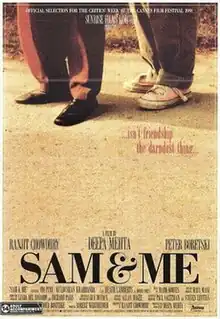| Sam & Me | |
|---|---|
 Theatrical release poster | |
| Directed by | Deepa Mehta |
| Written by | Ranjit Chowdhry |
| Produced by |
|
| Starring |
|
| Cinematography | Guy Dufaux |
| Edited by | Boyd Bonitzke |
| Music by | Mark Korven |
| Distributed by | ITC Entertainment[1] |
Release dates | May 1991 (Cannes Critics' Week) September 19, 1991 (Cinefest Sudbury International Film Festival) |
Running time | 94 minutes |
| Country | Canada |
| Languages | English Hindi |
Sam & Me is a 1991 Indo-Canadian drama film directed by Deepa Mehta (in her directorial debut) and written by Ranjit Chowdhry, who also stars in the film with Peter Boretski and Om Puri. The film went on to win an honourable mention at the Cannes Film Festival.[2]
Plot
23-year-old Nikhil, an Indian immigrant, has just arrived to Canada looking forward to working with his uncle at a hospital-supply business. Nikhil is begrudgingly convinced by his uncle to also be a caregiver and companion to Sam Cohen, an elderly, cantankerous Jewish man. Sam does not get along with his adult son Morris, who owns the business Nikhil works for. As an unlikely friendship forms between Nikhil and Sam, both men gain new insight into life.
Cast
- Ranjit Chowdhry as Nikhil "Shwartza" Parikh
- Peter Boretski as Sam "Zayda" Cohen
- Om Puri as Chetan Parikh
- Heath Lamberts as Morris Cohen
- Kulbhushan Kharbanda as Baldev
- Javed Jaffrey as Xavier
Production
On her inspiration for the film, Deepa Mehta said, "I was a Canadian who still thought of herself as an Indian. My home was Delhi, yet my daughter was in Toronto, as was my home with my then-husband. It was a confusing period in my life. As an immigrant, why was I still nostalgic for my homeland? How and when does one transfer their allegiance to another country? While I had luckily not experienced any overt racism, I could feel it brimming under the polite Canadian surface…it made perfect sense for me to do a film about Indian immigrants to Canada and their hopes, desires, and tribulations."[3][4]
Release
The film broke the record for the highest-budgeted film directed by a woman in Canada.[5] At the 1991 Cannes Film Festival, it won an honourable mention for the Caméra d'Or prize.[6][7]
Reception
Rick Groen wrote in The Globe and Mail: "In her feature debut, director Deepa Mehta has made one of those fascinating, frustrating films where the sub-plot outshines the plot, where everything on the periphery of the frame is infinitely better than the nominal focal point. Because there, at the edges, we're treated to ethnic humour worthy of the label -- well-observed moments that explode some stereotypes and confirm others, moments that are wry and sharp and poignant."[8]
Academic Kass Banning wrote, "Signifying the promise and the perils of cross-cultural dialogue, Sam and Me both validates and negates the multiculturalist utopian myth of interethnic cooperation."[9]
Home media
In 2018, the film was released online for free on Canada Media Fund's Encore+ YouTube channel.
References
- ↑ "Sam & Me Production Credits". The New York Times. Archived from the original on September 26, 2015.
- ↑ Canby, Vincent (21 May 1991). "'Barton Fink' Wins the Top Prize And 2 Others at Cannes Festival". The New York Times. Retrieved 4 July 2015.
- ↑ Mehta, Deepa (July 30, 2017). "Deepa Mehta Shares Her Journey in Film (Death Threats Included)". TIFF.net. Retrieved 20 June 2023.
- ↑ Wise, Wyndham (September 1, 2002). "Bollywood North: an interview with Deepa Mehta". Take One. Retrieved 20 June 2023.
- ↑ "Deepa Mehta: The Indo-Canadian filmmaker who is challenging stereotypes and traditions". Global Indian. September 14, 2021. Retrieved 20 June 2023.
- ↑ "Deepa Mehta". Canadian Film Encyclopedia. Retrieved 20 June 2023.
- ↑ "Sam & Me". festival-cannes.com. Retrieved 20 June 2023.
- ↑ Groen, Rick (September 20, 1991). "Sam & Me". The Globe and Mail. Retrieved 4 July 2015 – via Canadian Women Filmmakers Database.
- ↑ Banning, Kass (1999). "Playing in the Light: Canadianizing Race and Nation". In Banning, Kass; Armatage, Kay; Longfellow, Brenda; Marchessault, Janine (eds.). Gendering the Nation: Canadian Women's Cinema. Toronto: University of Toronto Press. p. 293. ISBN 978-0802041203.